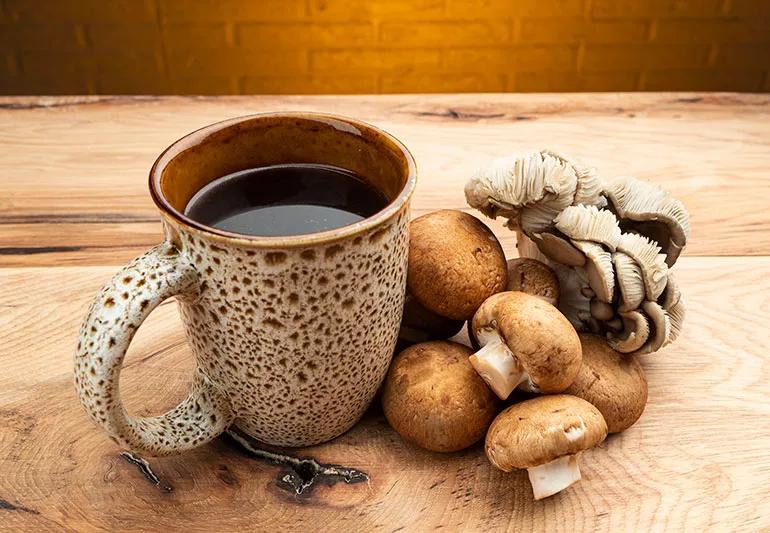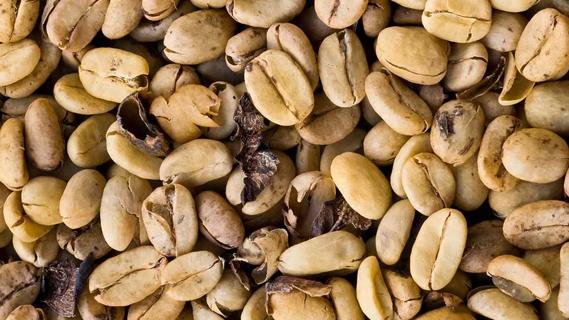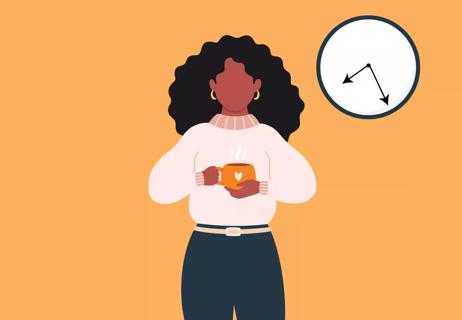Mushroom coffee is expensive and has fewer health benefits than eating whole mushrooms

Is your social media timeline filled with people sipping on a warm, coffee-like drink … that’s made with mushrooms? You’re not the only one.
Advertisement
Cleveland Clinic is a non-profit academic medical center. Advertising on our site helps support our mission. We do not endorse non-Cleveland Clinic products or services. Policy
The idea of adding mushrooms to your diet as a wellness incentive isn’t exactly new. Adaptogens of all sorts have been part of traditional Chinese medicine and Ayurvedic medicine for thousands of years. But mushrooms have been having a moment — an extended one — in the Western world. It’s easier than ever to find mushroom powder, extract, tonics and gummies to heal what ails you — and many people are singing their praises.
But come on now, mushroom coffee? That can’t possibly taste good … can it?
“Interestingly enough, mushroom coffee tastes pretty similar to regular coffee,” says registered dietitian Beth Czerwony, RD. “It is, after all, coffee with mushroom extracts blended in.”
So, is this type of coffee worth the hype — and all the extra expense? We talked to Czerwony to find out.
Thankfully, you don’t just toss a couple of mushrooms into your coffee and call it a day (because that would be, well, gross). Mushroom coffee comes in a wide range of preparations, but the most common looks like your regular, run-of-the-mill coffee grounds. The mushrooms go through a drying and extraction process in order to pull the beneficial compounds out, which then get blended into regular coffee.
Advertisement
It tastes like coffee because it is coffee!
You can also buy mushroom coffee grounds, pre-made mushroom coffee lattes, instant mushroom coffee packets and mushroom coffee pods. The most popular mushrooms found in these blends typically include:
There are a lot of claims surrounding the benefits of mushroom coffee. Some of the most popular claims about mushroom coffee are that it:
But is there any truth to these statements?
“Mushrooms in general have some really great benefits,” notes Czerwony. “A big one tends to be reducing inflammation. Mushrooms also contain antioxidants, which can help support the immune system.”
Mushroom coffee also has less caffeine, which (depending on who you ask) usually helps people feel less anxious and sleep better.
But take the long list of benefits specific to mushroom coffee with a grain of salt. There isn’t a ton of research out there suggesting that all of the claims actually hold true. The hype around mushroom coffee is built on an untested assumption: That all the benefits of mushrooms continue to exist when they’re processed and brewed alongside your morning coffee. But we simply don’t know that to be the case.
It’s important to note that mushrooms can sometimes cause digestive issues, especially for those who have kidney issues or trouble with grains. In fact, chaga mushrooms are high in oxalates and are known to affect and increase kidney stones. If you have digestive problems, it’s best to speak with a healthcare provider or meet with a dietitian before heading down the fungi path.
Mushroom coffee costs about double what you’d pay for the average coffee, so deciding whether or not to try it is as much a financial decision as it is a nutritional one.
Given the lack of research on mushroom coffee, Czerwony isn’t inclined to recommend it. You’d probably be better off incorporating whole mushrooms into your diet, rather than sipping special (and pricey) coffee. But if you don’t mind the cost and want to try starting your day with mushroom coffee, Czerwony suggests trying one type of mushroom powder at a time and tracking any symptoms you might experience.
“There’s really nothing wrong with mushroom coffee as long as you’re not adding in a ton of sugar or creamer,” she adds. “But you’ll also experience the same benefits — and more, including the fiber — if you just eat mushrooms normally in your diet.”
Advertisement
Mushrooms are great for you and should definitely find their way to your stomach one way or another. But if your goal is improving your health, your best bet is eating whole mushrooms, not drinking processed ones in your extra-expensive coffee. Nutrition-wise, there simply isn’t mush-room for improvement on the original. There’s also no meaningful research supporting the health claims mushroom coffee purveyors make about the stuff. That said, as long as you don’t have digestive or kidney issues, it’s probably safe to try.
Advertisement
Learn more about our editorial process.
Advertisement

The caffeine and natural acids in coffee may trigger acid reflux, but there are ways to lessen the effects

Along with boosting your energy, a moderate amount of coffee can help lower your risk of Type 2 diabetes, liver disease and certain cancers

That cup of joe may help decrease inflammation and remove damaged cells in the vital organ

Coffee is made up of mostly water, but it’s the caffeine you have to look out for

There’s no evidence to prove this supplement can help with weight loss, and it may come with risks

Morning, noon or night — the best time for that cup of joe depends on you

Depending on your sensitivity to caffeine, a late-night cup may be just fine

It’s fine for most, but it can worsen heartburn and ulcers if you’re prone to them

Wearing a scarf, adjusting your outdoor activities and following your asthma treatment plan can help limit breathing problems

Your diet in the weeks, days and hours ahead of your race can power you to the finish line

When someone guilt trips you, they’re using emotionally manipulative behavior to try to get you to act a certain way